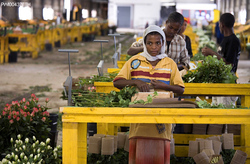
Food & Business Knowledge Platform | February 16, 2016
New study on Dutch floriculture investments in eastern Africa and the impacts on local food security
By: F&BKP Office
The Netherlands Academy on Land Governance (LANDac) / IDS Utrecht University has conducted a scoping study on Dutch flower farms, land governance and local food security in eastern Africa within the Food & Business Knowledge Platform (F&BKP). While earlier research focused mainly on evaluating the socioeconomic and environmental impacts of floriculture investments, there is still a significant knowledge gap on the land governance arrangements around the investments, and how the investments impact local food security. In this report, the complex linkages between land governance – policies and regulations governing the access to and use of land – and how they relate both directly and indirectly to local food security have been studied. The study found that floriculture investments have both negative and positive impacts on local development and local food security: through land use changes and land acquisition processes; through job creation and employment conditions and; through technology and knowledge transfers.
Download the report “Flowers for food?” here.
Background
The findings of the Dutch flower sector contributions to local development and food security are based on field research that was conducted in four countries hosting communities of Dutch flower farmers, namely Kenya, Tanzania, Uganda and Ethiopia. Interviews and focus group discussions were conducted with flower company representatives and their employees, neighbouring households as well as key informants such as local chiefs and elders, businesspersons active in the food sector, government employees and representatives from NGOs.
“Flowers for food?” Key findings
The study highlights complex and multi-level impacts of Dutch private investments on local food security in the four countries. A first impact is through land use change. Flower farms have been established on land that was previously used for different purposes, including: smallholder farming and food production; pastureland and forests; floriculture and other cash crops; or land that was uncultivated. The land use change is one of the impacts on local food security. In terms of acquisition, land was usually acquired through the market or the state, with consultation of local communities being rather limited or taking place on a voluntary basis.
While land acquisition has often decreased local people’s access to land, and sometimes food production, the establishment of the flower farms has generated needed employment opportunities through a labour intensive industry, especially amongst women. Employment therefore is the primary contribution of Dutch floriculture investors in eastern Africa: through waged labour, employees gain access to food. These impacts were found to be complex, especially because most employees originated from other parts of the countries and established themselves in the areas following the establishment of flower farms. This in turn has led to higher food prices at local markets, yet it has also stimulated local economic activities.
Examples showed that the floriculture sector can, under certain circumstances, transfer knowledge and contribute to local agricultural development with well-thought-out mechanisms in place. An example is provided by the smallholder out-grower scheme that is showcased in the report and serves as evidence that floriculture can be modified so that it can be practiced at smaller scales by local smallholder farmers. Such a setting contributes to increasing local food security through agricultural knowledge transfer and changing perceptions about agriculture and its potential to make a business out of it.
Knowledge agenda
The Netherlands is a primary producer of flowers in eastern Africa. At the same time, the Dutch government views private sector investments as levers for poverty alleviation and inclusive growth, and envisions a contribution to food security by those means. However the current study, as well as another study carried out within the F&BKP that focused on the fruit and vegetable sector, shows that linkages between the investments and impacts locally are often complex and therefore more research needs to be done to uncover these relationships. Moreover, there is a need to stimulate the dialogue between different stakeholders, including the floriculture sector.
In response to this need, LANDac developed a knowledge agenda around land governance and food security. Three country-specific learning platforms in Uganda, Ghana and Ethiopia have been set up, while Utrecht University (International Development Studies) in collaboration with Kenyan, Ethiopian, Ghanaian and Dutch partners has embarked on a long-term research project called, “Follow the food”. In order to contribute to the dialogue between different stakeholders, LANDac presents the outcomes of their research at several occasions, including its multi-stakeholder think-tank the LANDforum, its annual summer school and meetings with different partners such as the World Bank, the Ministry of Foreign Affairs and the Netherlands Enterprise Agency. The possibility of follow-up field studies of community-level attitudes and ideas for collaboration in areas of Dutch flower farms in close collaboration with the flower farmers is currently being explored. For more related activities, keep an eye on the F&BKP website or contact Vanessa Nigten.












